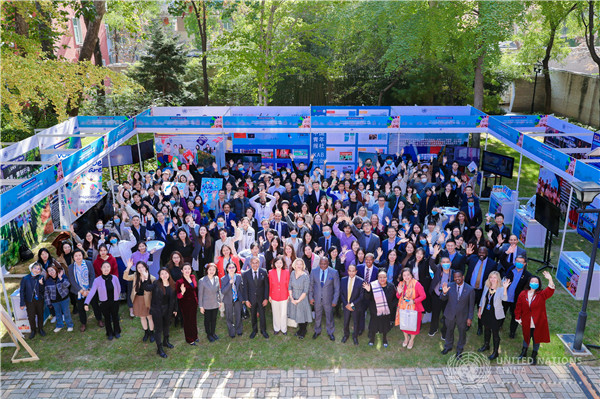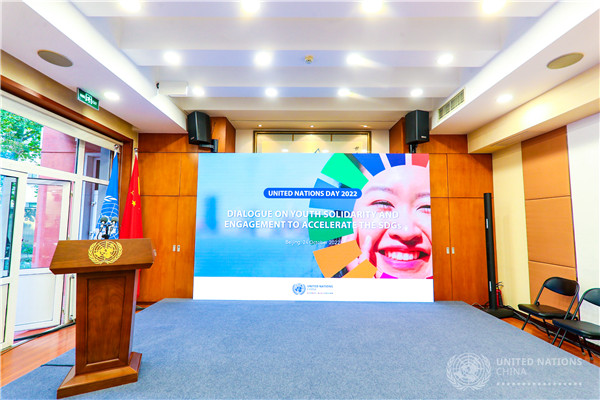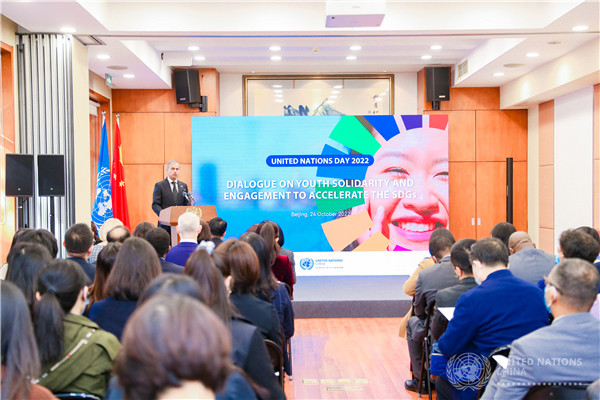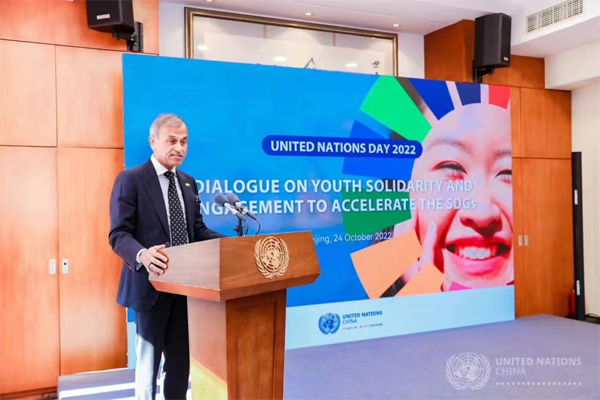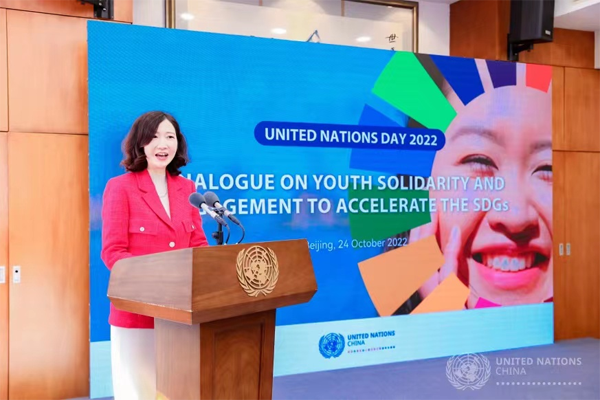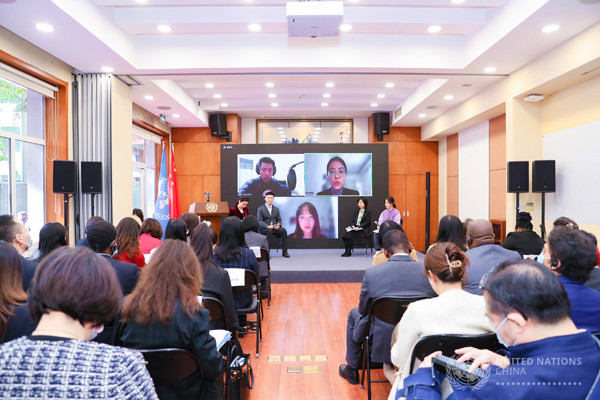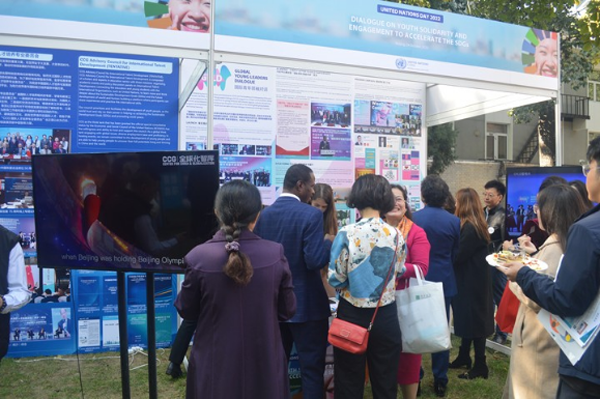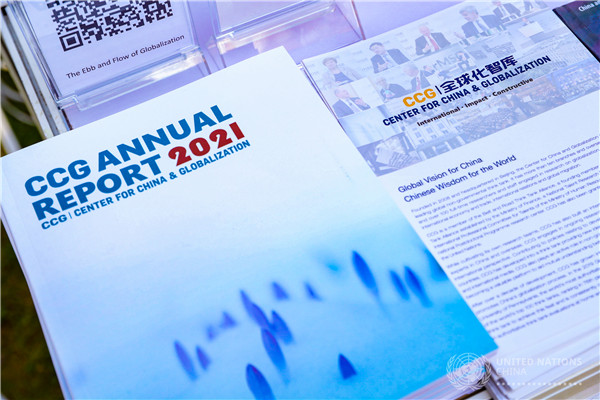GYLD youth perspectives take front and centre at joint UN Day gathering
October 25 , 2022As part of the celebrations for the 77th United Nations Day, the United Nations in China, in collaboration with the Center for China and Globalization (CCG), held the “Dialogue on Youth Solidarity and Engagement to Accelerate the Sustainable Development Goals (SDGs)” on 24 October.
Celebrated every year, UN Day marks the anniversary of the day in 1945 when the UN Charter entered into force, offering an opportunity for the international community to reaffirm the purposes and principles of the Organization.
This year, the UN in China used the occasion to create a space that puts youth at the centre, to share their hopes and aspirations for the future, while underscoring the importance of intergenerational solidarity in realizing the vision of the 2030 Agenda for Sustainable Development and achieving the SDGs.
The youth-led Dialogue, in part, focused on how digital technologies can help deliver on the key commitments outlined in the SDGs, while highlighting the innovative work of related youth-led organizations working in the public interest. More than 160 participants attended the event in person and online, including youth representatives from several regions of the globe, representatives from the international community in China, the Host Government, and development partners with a mandate on youth engagement and empowerment.
In his opening remarks, Mr. Siddharth Chatterjee, UN Resident Coordinator in China, said, “Youth are the torchbearers of a sustainable future, but to accomplish the daunting task of realizing the 2030 Agenda for Sustainable Development and all 17 SDGs, we must all come together, overcome age-related barriers, and foster intergenerational solidarity to promote our common agenda. We can only ‘build back better’ when we leverage all generations’ knowledge and strengths.”
Dr. Mabel Lv Miao, Secretary-General of CCG and founder of the Global Young Leaders Dialogue (GYLD), said, “As the UN Secretary-General mentioned, the UN is the product of hope. Young people are also the hope of humanity. So today should serve as a lesson for us to learn about how we can unite and engage with more young people, and the importance of solidarity in accelerating the SDGs. ”
Presentations were followed by a panel discussion and Q&A with Chinese youth who have been leaders in their respective fields in developing technologies that help accelerate progress toward achievement of the SDGs, including in the areas of climate change, gender equality, and ending hunger, among others. Panellists emphasized the need to harness emerging innovations in a manner that addresses global challenges while taking care to mitigate potential consequences for vulnerable groups, in order to Leave No One Behind.
Mr. Zhao Chen, UNICEF Youth Advocate on digital accessibility and inclusion, said to the audience: “I am visually impaired. I am aware of the concerns of people with disabilities, and I understand what kind of supports are in need. From my experience working for the social community, I still see issues to be addressed, and I hope that more efforts can be made so that society can see the challenges faced by people with disabilities, and treat us as regular members of the society.”
The event concluded with an interactive fair featuring the work of organizations working for and with youth across a number of the SDGs. Participating organizations used the opportunity to present their work, share relevant publishing material, and connect with attendees and other like-minded groups. The GYLD booth saw a constant flow of guests from the UN Dialogue and young people eager to learn about the prospect of the program.
The Dialogue on Youth Solidarity and Engagement also welcomed guests from the Ministry of Foreign Affairs and the China International Development Cooperation Agency (CIDCA), who gave remarks and presentations, intiating discussions with global young leaders. The Dialogue was attended by representatives and coordinators from UNFPA, UNICEF and other UN China entities, NGOs engaging in youth development, top universities, as well as representatives and students from international schools.
About CCG
The Center for China and Globalization (CCG) is a Chinese non-governmental think tank based in Beijing. CCG has been granted the official special consultative status by the Economic and Social Council of the United Nations (ECOSOC) as a non-governmental organization. In 2020, CCG and the Academy of Contemporary China and World Studies (ACCWS) jointly initiated the GYLD program, which aims to provide a global public good by creating a platform for young people from diverse backgrounds to exchange and foster meaningful friendships, and to promote a more inclusive, diverse, and open youth engagement in achieving UN SDGs.
